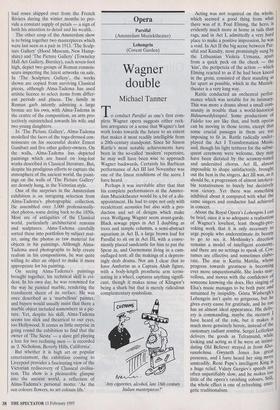Opera
Parsifal
(Amsterdam Muziektheater)
Lohengrin
(Covent Garden)
Wagner double
Michael Tanner
To conduct Parsifal as one's first com- plete Wagner opera suggests either reck- less arrogance or a sense that Wagner's last work looks towards the future to an extent that makes it most readily intelligible from a 20th-century standpoint. Since Sir Simon Rattle's most notable achievements have been in the so-called 'modern' repertoire, he may well have been wise to approach Wagner backwards. Certainly his Barbican performance of Act III last November was one of the finest renditions of the score I have heard.
Perhaps it was inevitable after that that his complete performances at the Amster- dam Muziektheater would be a, bit of a dis- appointment. He had to cope not only with recalcitrant acoustics but also with a pro- duction and set of designs which make even Wolfgang Wagner seem avant-garde. Black sewage pipes in Act I doubling as trees and temple columns, a semi-abstract aquarium in Act II, a large brown loaf for Parsifal to sit on in Act III, with a conve- niently placed sandcastle for him to put the Spear in, and Gurnemanz living in a cam- ouflaged tent: all the makings of a depress- ingly drab drama. Nor am I clear that to have Amfortas as a Captain Ahab figure, with a body-length prosthetic arm termi- nating in a wheel, captures anything signifi- cant, though it makes sense of Klingsor's being a shark but that is merely ridiculous complementary symbolism.
Any cigarettes, alcohol, late 18th century Italian masterpieces?' Acting was not required on the whole, which seemed a good thing from what there was of it. Poul Elming, the hero, is evidently much more at home in tails than rags, and in Act I, admittedly a very hard place to make a positive impression, he was a void. In Act II the big scene between Par- sifal and Kundry, most promisingly sung by the Lithuanian Violeta Urmana, apart from a quick peck on the cheek — the `kiss', the peripeteia of the action — which Elming reacted to as if he had been kneed in the groin, consisted of their standing as far apart as possible, which in the Muziek- theater is a very long way.
Rattle conducted an orchestral perfor- mance which was notable for its intimacy. This was more a drama about a small com- munity in trouble than a world-historical Biihnerweihfestspiel. Some productions of Fidelio too are like that, and both operas can be moving in those terms, except that some crucial passages in them are too imposing to fit in. Rattle radically under- played the Act I Transformation Music, and, though his light textures for the subse- quent ceremony were welcome, they may have been dictated by the scrawny-toned and undersized chorus. Act II, almost impossible to shape satisfactorily, brought out the best in the singers. Act III was, as it should be, a progression of almost intolera- ble tentativeness to barely but decisively won victory. Yet there was something inhibited about it compared with what the same singers and conductor had achieved in concert.
About the Royal Opera's Lohengrin I can be brief, since it is so adequate a realisation of Wagner's loveliest, least thought-pro- voking work that it is only necessary to urge people who underestimate its beauty to go to see it. Moshinsky's direction remains a model of intelligent economy, and there are no settings to speak of. Cos- tumes are effective and sometimes elabo- rate. The star is Karita Mattila, whose progress towards greatness is becoming ever more unquestionable. She looks mar- vellous, and moves with the confidence of someone knowing she does. Her singing of Elsa's music manages to be both pure and untainted by insipidity. Gosta Winbergh's Lohengrin isn't quite so gorgeous, but be gives every cause for gratitude, and he too has an almost ideal appearance. His deliv- ery is commanding, maybe the sternest I have heard of the role, but it makes it much more genuinely heroic, instead of the customary radiant zombie. Sergei Leiferkus delivers the goods as Telramund, while looking and acting as if he were an intimi- dating Old Believer strayed in from Kilo" vanshchina. Gwyneth Jones has great presence, and I have heard her sing more unsteadily. Rene Pape's intelligent King is a huge relief. Valery Gergiev's speeds are often unjustifiably slow, and he makes too little of the opera's ravishing colours. Still, the whole effect is one of refreshing, ener- getic traditionalism.


























































 Previous page
Previous page